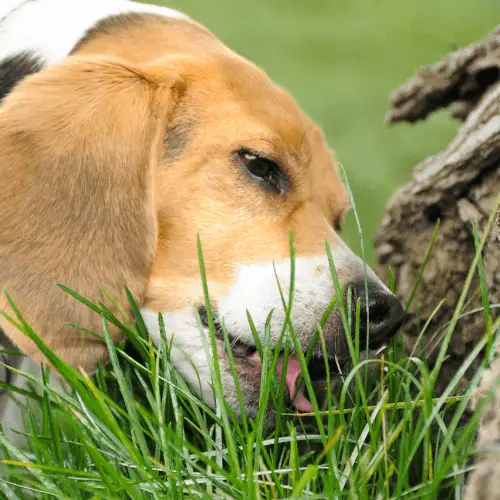Why Does My Dog Eat Grass?
As a dog owner, I’ve often observed my furry friend munching on grass and wondered, “Why does my dog eat grass?” This common behavior can be puzzling for many pet parents. In this article, we’ll explore the possible reasons behind grass eating in dogs and address some frequently asked questions. From dietary deficiencies to ancestral instincts, there are various factors that might contribute to this intriguing habit. So, let’s dive in and uncover the mystery behind our dogs’ love for grass.
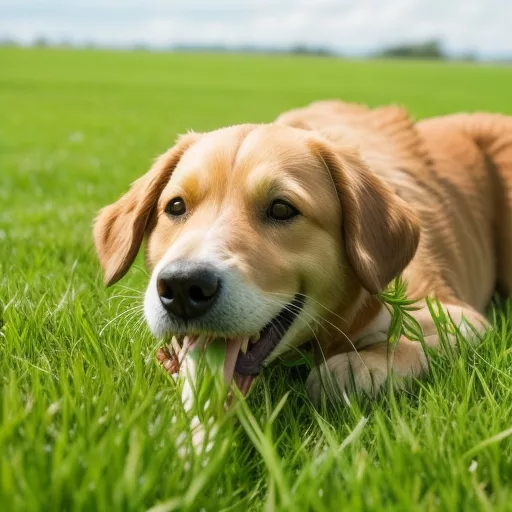
Possible Reasons for Grass Eating
There are several possible reasons why dogs eat grass, and understanding these factors can help us better care for our canine companions. Here are some of the most common explanations:
- Dietary deficiency: Dogs may eat grass to compensate for a lack of nutrients, vitamins, or minerals in their diet. However, dogs on well-balanced diets should not be nutritionally deficient, so this reason may not apply to all dogs.
- Digestive aid: Eating grass can help dogs with digestion and provide them with fiber. Some dogs may consume grass to improve their digestion or to help them go to the bathroom properly.
- Boredom or anxiety: Some dogs eat grass to pass the time or cope with stress. In these cases, providing more mental stimulation and exercise may help reduce grass eating behavior.
- Ancestral behavior: Grass eating could be a reflection of dogs’ scavenger instincts, as their wild ancestors may have consumed plant material as part of their diet.
- Taste: Some dogs simply enjoy the taste and texture of grass, and it may be a harmless habit as long as it doesn’t cause any health issues.
Nutritional Needs and Diet Adjustments
A well-balanced diet is essential for your dog’s overall health. To ensure your dog receives all the necessary nutrients, their diet should include:
- Proteins
- Carbohydrates
- Fats
- Vitamins
- Minerals
- Water
If you suspect that your dog is eating grass due to a dietary deficiency, it’s important to consult your veterinarian to discuss possible adjustments to their diet. This may include adding more fiber or other essential nutrients. Some ways to provide additional fiber in your dog’s diet are:
- Adding dog-safe vegetables, such as green beans, carrots, or pumpkin
- Incorporating high-fiber dog treats or supplements
- Feeding a high-quality commercial dog food that is labeled “complete and balanced nutrition”
By ensuring your dog’s nutritional needs are met, you can help reduce their desire to eat grass as a means of compensating for any deficiencies.
Did you know that chocolate can kill a dog?
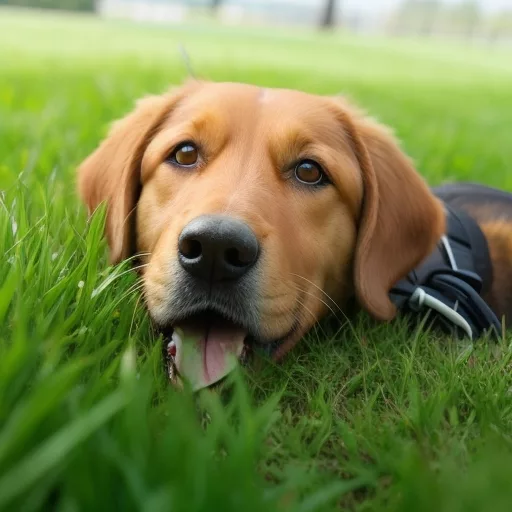
Behavioral and Environmental Factors
The role of boredom, anxiety, and the dog’s environment can significantly influence grass eating behavior. Here are some factors to consider:
- Boredom: Dogs may eat grass to pass the time when they are bored. Providing mental stimulation through puzzle toys, training, and playtime can help keep your dog entertained and reduce grass eating.
- Anxiety: Some dogs may eat grass as a coping mechanism for stress or anxiety. Addressing the root cause of your dog’s anxiety and offering comfort items, such as a familiar-scented blanket or a new toy, can help alleviate their stress.
- Environment: The availability of grass in your dog’s environment can influence their grass eating habits. If your dog has easy access to grass, they may be more likely to indulge in this behavior.
By understanding the role of these factors in your dog’s grass eating behavior, you can take appropriate steps to address the issue and ensure your dog’s overall well-being.
When to Consult a Veterinarian
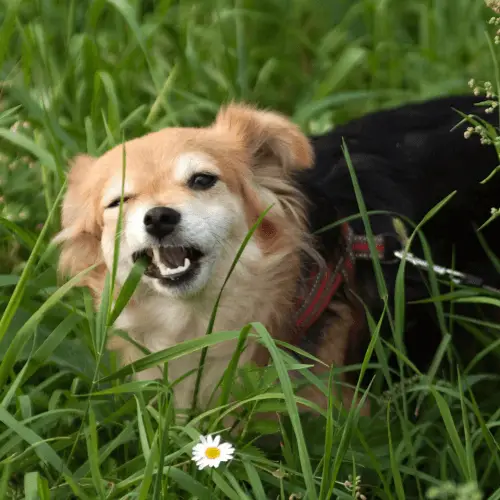
While occasional grass eating is usually harmless, there are situations when it’s necessary to seek professional help for a dog that frequently eats grass. Here are some signs that it’s time to consult your veterinarian:
- Persistent vomiting: If your dog consistently vomits after eating grass, it could indicate an underlying health issue, such as gastric reflux or inflammatory bowel disease.
- Diarrhea: Frequent grass eating accompanied by diarrhea may signal a digestive problem that requires medical attention.
- Lethargy: If your dog is eating grass and also appears lethargic or unwell, it’s important to consult your veterinarian to rule out any serious health concerns.
- Sudden increase in grass eating: A sudden increase in your dog’s grass eating behavior, especially if accompanied by other symptoms, could indicate an issue that needs to be addressed by a professional.
In any of these situations, it’s essential to consult your veterinarian to determine the cause of your dog’s grass eating behavior and receive appropriate treatment.
Preventing Grass Eating
If you’re concerned about your dog’s grass eating habits, there are several tips and strategies you can use to discourage this behavior:
- Alternative sources of fiber: Provide your dog with alternative sources of fiber, such as dog-safe vegetables (e.g., green beans, carrots, or pumpkin) or high-fiber dog treats. This can help satisfy their craving for roughage and reduce their desire to eat grass.
- Mental stimulation: Keep your dog mentally engaged with puzzle toys, training sessions, and playtime. This can help alleviate boredom, which might be a reason for grass eating.
- Designated grazing area: Create a designated area in your yard with dog-friendly grass that is safe for your dog to eat. This can help control their grass eating habits and ensure they’re not consuming harmful substances.
- Yard maintenance: Regularly maintain your yard to keep it free of pesticides, fertilizers, and other harmful chemicals that could pose a risk to your dog’s health if ingested.
- High-fiber diet: Consult your veterinarian about providing your dog with a high-fiber diet, which can help move food through their digestive system and prevent constipation, reducing their desire to eat grass.
- Alternative materials: If your dog’s environment is a contributing factor, consider using alternative materials in your yard, such as pea gravel or artificial turf, to discourage grass eating.
By understanding the reasons behind your dog’s grass eating behavior and implementing these strategies, you can help keep your dog healthy and happy.
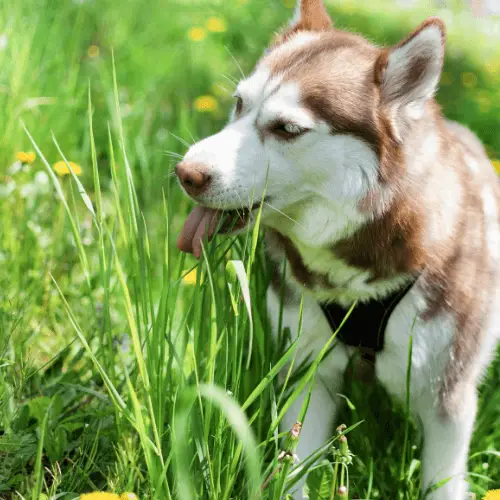
Personal Stories and Experiences
As a dog owner, I’ve encountered my fair share of grass-eating incidents with my furry friend. Here are some personal anecdotes and experiences related to dogs eating grass:
- The curious puppy: When my dog was a puppy, she was extremely curious and would often nibble on grass during our walks. Over time, as she became more familiar with her surroundings, her grass eating habits decreased significantly.
- Boredom buster: I noticed that my dog would eat grass more frequently when she was bored or had excess energy. By providing her with more mental stimulation and exercise, I was able to reduce her grass eating behavior.
- Anxiety relief: During a particularly stressful period, my dog started eating grass more often. I realized that she was using grass eating as a coping mechanism for her anxiety. By addressing the root cause of her stress and offering comfort items, her grass eating habits subsided.
- Dietary adjustments: At one point, I suspected that my dog’s grass eating was due to a dietary deficiency. After consulting with my veterinarian and making some adjustments to her diet, her grass eating behavior decreased.
These personal experiences have helped me better understand the various reasons behind my dog’s grass eating habits and have allowed me to address any underlying issues to ensure her overall well-being.
Conclusion
In this article, we’ve explored the various reasons behind dogs eating grass, including dietary deficiencies, digestive aid, boredom or anxiety, ancestral behavior, and taste preferences. We’ve also addressed common questions related to this behavior and discussed the importance of a well-balanced diet for dogs, as well as how to provide additional fiber if needed.
We’ve examined the role of boredom, anxiety, and the dog’s environment in grass eating behavior and provided guidance on when to consult a veterinarian for dogs that frequently eat grass. Additionally, we’ve shared tips and strategies for preventing grass eating, such as providing alternative sources of fiber and mental stimulation.
By understanding the reasons behind your dog’s grass eating habits and implementing the strategies discussed in this article, you can help ensure the overall well-being of your canine companion. Remember to always consult your veterinarian if you have concerns about your dog’s health or behavior.
Frequently Asked Questions
Here are some common questions related to dogs eating grass, along with their answers:
- Is eating grass harmful to my dog? In most cases, eating grass is harmless. However, if the grass contains harmful substances like pesticides or feces, it can pose a risk to your dog’s health.
- Why do dogs eat grass and vomit? Eating grass can irritate the stomach lining, triggering the vomiting reflex. This may be a way for dogs to expel something that’s causing discomfort in their stomach.
- Can eating grass be a sign of an underlying health issue? While grass eating is often harmless, it can sometimes indicate an upset stomach or a dietary deficiency. If you’re concerned about your dog’s grass eating behavior, consult your veterinarian.
- How can I prevent my dog from eating grass? To discourage grass eating, provide alternative sources of fiber, such as dog-safe vegetables or high-fiber dog treats. Also, offer mental stimulation through puzzle toys, training, and playtime.
- When should I be concerned about my dog eating grass? If your dog frequently eats grass and exhibits other concerning symptoms, such as vomiting, diarrhea, or lethargy, it’s essential to consult your veterinarian.
By understanding the reasons behind your dog’s grass eating habits and addressing any underlying issues, you can help ensure their overall well-being.
Hi, I’m John and I love dogs. Ever since I was a kid, I always wanted to have a furry friend by my side. I grew up with a golden retriever named Max, who taught me a lot about loyalty, friendship, and fun. He was my best buddy for 12 years, and I miss him every day.
